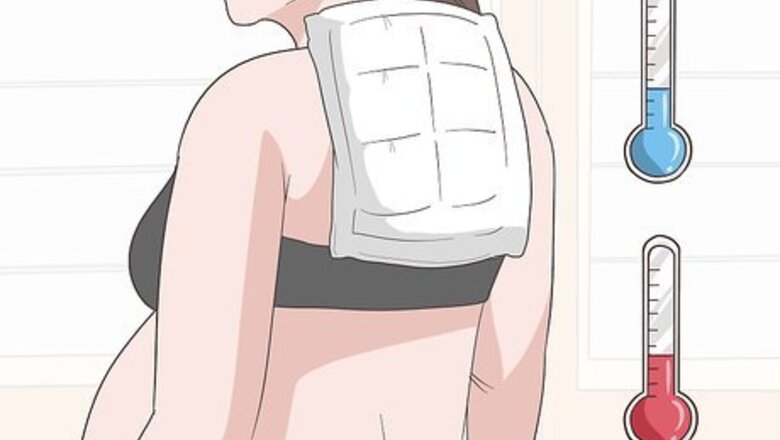
views
Getting Quick Relief
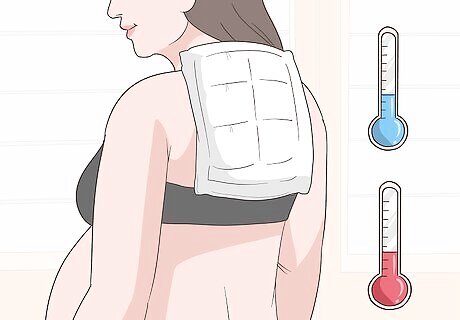
Apply a heating pad or cold pack to ease pain in your upper back. To make a heating pad, fill a sock halfway with uncooked rice, tie the end of the sock in a knot, and microwave the sock for 1 minute. If you want to make a quick ice pack, wrap a paper towel around a bag of frozen corn or peas. Place the hot or cold pack on the affected area of your upper back for 10-15 minutes. Then, wait 1 hour before repeating the treatment. You can repeat the treatment as many times as needed during the day to soothe your back pain. Heat and cold therapy are effective for soothing minor backaches, and these pain relief options are also very safe to use while you are pregnant.
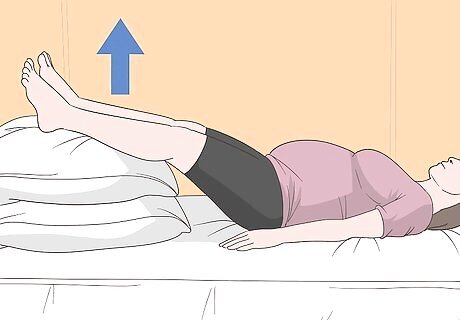
Rest or lie down with your feet elevated to reduce back strain. If you’ve been standing or sitting for a while, you might have built up some tension in your back. Sit down if you have been standing or lie down if you have been sitting. Prop your legs up on 1-2 pillows under your knees to provide extra comfort and support. This may help to reduce some of the strain on your back muscles and give you quick relief.Tip: If you’re having pain while lying down or reclining, try standing up and walking around for a few minutes to see if that helps. Sometimes simply moving around can be helpful for soothing back pain.
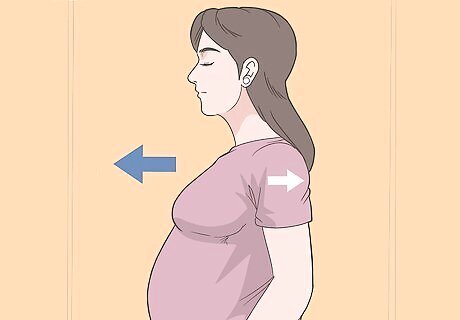
Stretch your back muscles by rounding and flattening your back. While sitting or standing, hunch your shoulders forward and hold them in this position for 5 seconds. Then, roll your shoulders back and sit up tall again. Repeat this 5-10 times to stretch the muscles in your upper back. This may help to release tension in your back and relieve your upper back pain. You can also try doing this exercise while down on your hands and knees on the ground. However, only do this if you are comfortable getting into this position. Roll your back up like a cat arching its back, hold for 5 seconds, and then flatten it again.
Use self-massage or a massager to relieve tension and stiffness. Rub stiff or painful areas using your hands and fingers. Apply a massage oil to deepen the massage and make it easier to knead your skin. As another option, hold a hand massager over tense or painful areas to help relieve your discomfort. Ask a partner, friend, or family member to give you a gentle massage.

Take acetaminophen if you need a pain reliever. If applying heat or cold, resting, and stretching do not help to ease your upper back pain, you may want to take an over-the-counter pain reliever, such as acetaminophen (Tylenol). Follow the manufacturer’s instructions for how much to take or check with your doctor if you’re unsure. Do not take NSAIDs during pregnancy, such as ibuprofen, naproxen, or aspirin. Check with your doctor if you're taking other medications before using any over-the-counter medications.
Preventing Back Pain
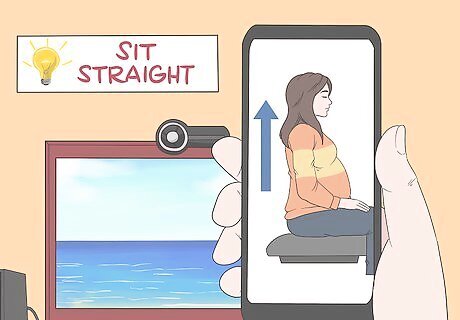
Stand up straight and avoid slouching while you're sitting down. Maintaining good posture may help to prevent back pain from developing. Remind yourself to sit and stand up straight as you go through your day. Try setting a reminder on your phone or posting notes for yourself where you will see them, such as on a bathroom mirror or above your computer. A maternity belt may also help to promote good posture for some people. Try wearing one to see if it helps.
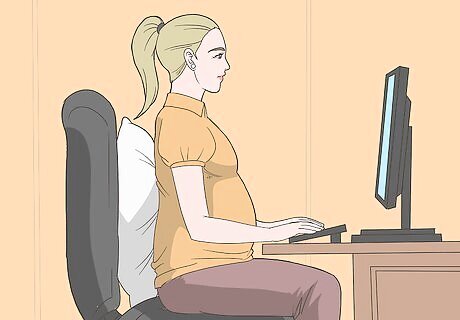
Sit in an ergonomic chair or place a pillow behind your back. Tell your employer if your chair is not comfortable and ask for a replacement. If you don’t have an ergonomic chair, then placing a small pillow behind your back may help to promote comfort. Get a pillow that provides back support and use it whenever you are sitting down. Make sure to sit up straight in your chair!
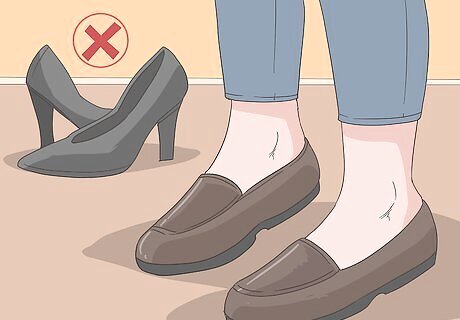
Wear comfortable, flat shoes and avoid high heels. High-heeled shoes can lead to back pain for some people, so it's best to avoid them completely while you're pregnant. Stick with flats that provide good arch support and feel comfortable. You could also try adding cushioned insoles to your shoes to help make them more comfortable. There are even some cushioned insoles that may help with back pain.
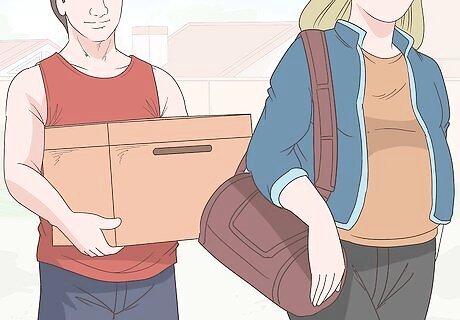
Lift small objects with your legs and ask for help lifting heavy items. Never lift anything heavy while you are pregnant as you may injure yourself. However, if you do need to lift something small, make sure to use your leg muscles to lift rather than your back muscles. Bend at the knees to get down closer to the object, grasp it with your hands, and then straighten your legs while keeping your back straight. If you need to lift something that weighs more than 10 lb (4.5 kg), ask someone to lift it for you.
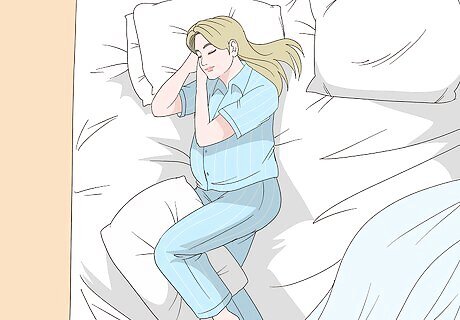
Sleep on your left side with pillows between your legs. Back pain may develop as you sleep if you are not sleeping in a comfortable position. Never sleep on your back while you are pregnant as this can result in decreased blood flow to your heart and your baby. Sleeping on your back while pregnant can also lead to backaches. Use a full body pillow to provide comfort and support to your entire body while you sleep. You can also try placing a pillow under your abdomen while lying on your side for extra support. Place 1-2 pillows behind you if you have trouble staying on your side. Tip: While lying on your left side is best for blood flow to your baby, it’s also okay to rotate from your left to right side while you sleep. Just avoid lying on your back or stomach.

Exercise for 30 minutes on most days to strengthen your back muscles. Regular exercise is great for you during pregnancy. It can also help to promote strong back muscles and minimize back pain. Find a form of exercise that you enjoy and that's safe to do while you are pregnant. Check with your doctor first to ensure that it's safe for you to start an exercise program. Stick with gentle exercises and avoid anything that involves lots of jumping, such as high-intensity interval training, or that carries a risk of falls, such as riding a bike or rollerblading. Some good exercise options during pregnancy include walking, swimming, prenatal yoga, or using an exercise machine, such as a recumbent bike or elliptical walker.
Adopt a healthy lifestyle to promote your overall health. Making healthy choices can help prevent or relieve upper back pain in a lot of ways. It helps you maintain a healthy weight, releases tension in your body, and reduces possible digestive issues. Make the following healthy choices to help reduce your risk of upper back pain: Eat nutritious foods Eliminate processed foods and pro-inflammatory foods Be active every day Avoid prolonged desk work Take frequent breaks Practice mindfulness Manage stress
Seeking Help
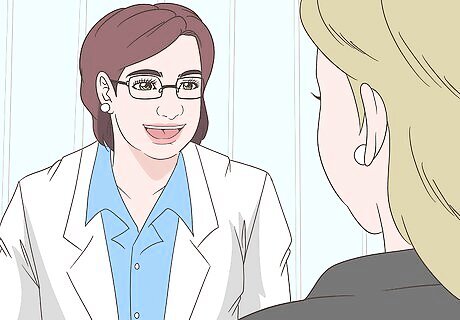
Talk with your doctor if the pain continues. If you continue to have upper back pain for more than 3 days or if it comes and goes over the course of 2 or more weeks, call your doctor. Let them know that you've been experiencing upper back pain and what you've done to try to relieve it. They can check for underlying conditions that may be causing the pain and they can also suggest additional treatments to help manage your pain. For example, your doctor may refer you to a physical therapist who can teach you exercises and stretches to reduce upper back pain. There are physical therapists who specialize in pre and postpartum physical therapy.
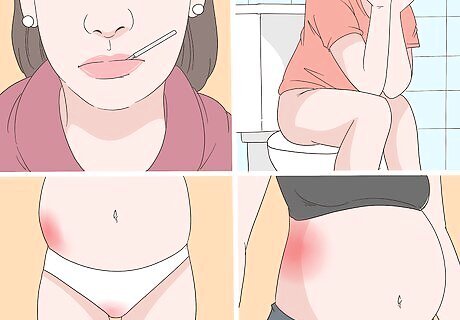
Go to a hospital if you have sudden or severe symptoms. Seek immediate medical care if your back pain is accompanied by cramping, vaginal bleeding, or if it comes on suddenly. In some situations, upper back pain can be a sign of premature labor, especially if you are in your second or third trimester. Other reasons to see a doctor immediately for pain in your upper back include: Fever Pain when you urinate Numbness in your backside or genitals Pain under your ribs on one side or both sides of your body
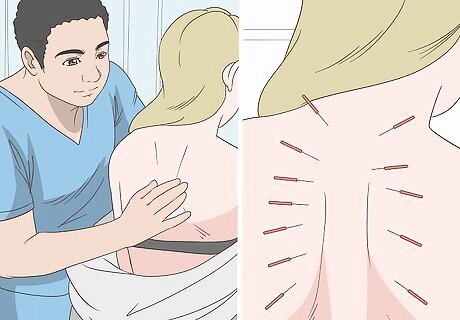
Look into chiropractic or acupuncture treatments for chronic pain. Alternative medicine practitioners, such as chiropractors and acupuncturists, may be able to help minimize your pain. Ask your doctor if they think this might be helpful for you and see if they can suggest a practitioner. You could also ask friends and family members for recommendations to help you find a chiropractor or acupuncturist. Acupuncturists insert small needles into the areas of your body where pain is present as well as areas that may be contributing to the pain. Chiropractors perform manual adjustments of your spine to promote better alignment and alleviate back pain. Safety Precaution: Make sure that you tell any alternative medicine practitioners you see that you are pregnant. Acupuncture and chiropractic treatments are generally safe during pregnancy, but it’s important to let them know so they can make adjustments to your treatment as needed for safety.
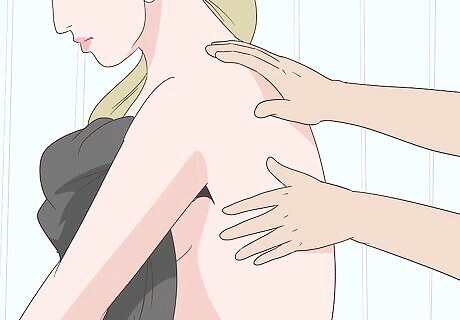
Get a prenatal massage from a qualified massage therapist. Massage is a great way to relax in general, but it can also relieve pain in your upper back. See a massage therapist who is experienced with prenatal massage and make sure to tell them that you are pregnant. Also, let them know that you’ve been having upper back pain so they can pay extra attention to that area. Try going for a massage once per month during your pregnancy to help promote relaxation and ease muscle tension. If you can't afford a massage, ask your partner or a friend to massage your upper back and shoulders for you. A 5-10 minute back rub may be enough to ease the tension in your muscles and give you some relief.




















Comments
0 comment